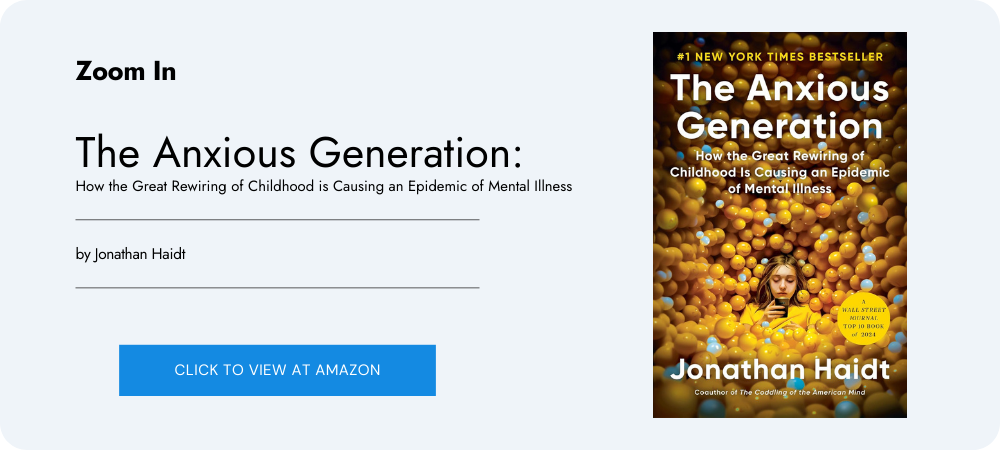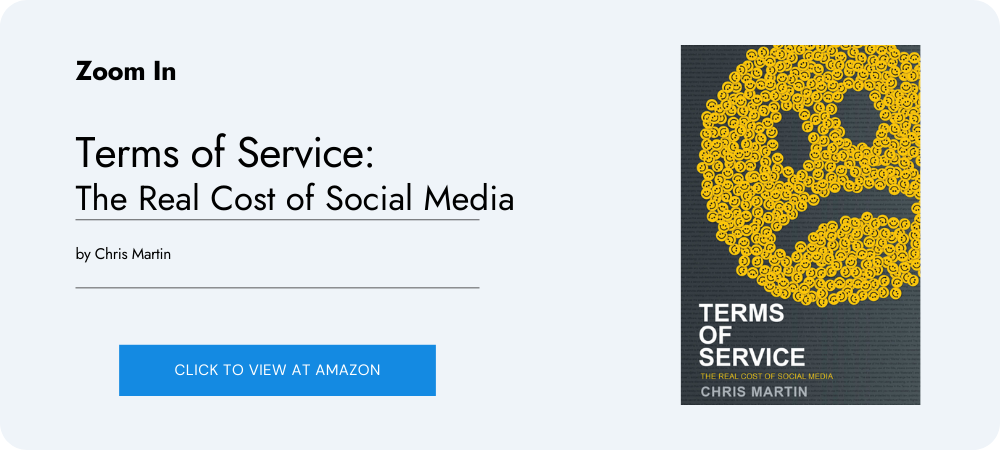After my son was born, I decided it was time to remove myself from social media, namely Facebook and Instagram. A couple of years into motherhood and some serious soul searching finally convinced me that nothing good was coming from my continued engagement with the two platforms. I maintained a Twitter account for several years after, but finally decided that it was not worth having either and logged off over a year ago. 1
Having been off social media for a while now, I’m even more convinced that deleting all social media is worth it–at least for those who have a problem with it.2 I’ve had several friends do the same, who say the same. If you’re not convinced, here are 5 reasons why you should consider deleting social media (and stop making up excuses for why you can’t!).
1. For Your Time
Let’s start with one of the most common reasons for deleting social media. At this point, it is common knowledge that social media companies deliberately design their products to be addicting to users with features like infinite scroll, the dopamine inducing “like” button, and personalized feeds.
I remember that habitual tap on my social media apps, particularly when I had nursing babies. I remember thinking I would have a lot of time to read e-books, since I’d be stuck under a baby for a stretch of time, several times a day. Instead, I scrolled social media for hours a day, often as if I had no control over the impulse to do so. Now, there is research to illustrate why.
While there may be ways to gain your time back without completely deleting social media, simply deleting the apps off your phone, setting a time limit, or even creating parental controls for yourself may not be enough. Just as abstinence is the only surefire way to prevent pregnancy, completely deleting your social media accounts is the only sure way to stop wasting time on them.3
2. For Your Health
To caveat this right off the bat, there are far more causes of mental health struggles than social media. However, if you struggle with non-clinical anxiety, fear, or anger, there’s a good chance that getting completely off social media will help relieve some of that, at least a little. On social media, we are inundated with endless bad news–both from actual news outlets and that random shared post from a stranger with the day’s horror story. Not only that, but we receive those stories through the contagious emotional lens of the person (or people) sharing and commenting on it.
To this point, Jonathan Haidt, in his book, The Anxious Generation, writes:
If world events played a role in the current mental health crisis, it’s not because world events suddenly got worse around 2012; it’s because world events were suddenly being pumped into adolescents’ brains through their phones, not as news stories, but as social media posts in which other young people expressed their emotions about a collapsing world, emotions that are contagious on social media.
If you are a believer who struggles with non-clinical anxiety and/or other emotional health issues, I would ask you to seriously consider the toll that social media may have on your mind and emotions. Then, consider whether social media helps you honor God with those thoughts and feelings.
We are exhorted in Scripture to fill our minds with things that are above (Colossians 3:2). Much of what we find on social media is not that which is from above. Even if you follow other Christians on social media, these platforms are not meant to be our primary source of spiritual wisdom and encouragement. While they may provide some of that, I’m not convinced that the benefit outweighs the consequences.
3. For Your (Actual) Community
Related, deleting social media helps us to be more present with our embodied community, while keeping up with the handful of important long distance relationships (such as with family members). Any Google search will reveal much discussion regarding the value of social media for maintaining relationships (for example, the varying views surrounding Dunbar’s number, “a suggested cognitive limit to the number of people with whom one can maintain stable social relationships”).
However, simple logic and self-awareness prove to us that we cannot reasonably maintain relationships with every person we’ve ever met and connected with on social media. If we are brutally honest with ourselves, there’s a good chance that while we say we’re on social media to maintain connections, we’re likely there to passively keep tabs on people without actually maintaining an active role in their lives. I can tell you right now, that’s what I did. I snooped on people without even so much as a “like” on most of their posts. Perhaps our claims of care and connection are more a fight against FOMO than maintaining genuine relationships. Not only that, but Facebook and Instagram algorithms have made it increasingly hard to filter past their own “suggestions” and see the people we actually follow.
Even if we genuinely want to care for the people on our social media feeds–maybe a former roommate or elementary school friend–we simply do not have the capacity to both care for them well and care for our immediate community well. We are limited by distance, time, and even mind share as we seek to remember their needs plus all the other needs of those in our vicinity. It’s not that we don’t love them, it’s simple human limits. Deleting social media frees us to care for our families, immediate community, and those at a distance with whom we actually stay in touch, because we have their phone numbers and call, text, and visit them regularly.
4. For Your Family
I am convinced that the best thing a new mom (particularly a first-time mom) can do when her baby is born—or even when she finds out she’s pregnant—is to completely delete her social media accounts. Hot take? Yes, it likely is. I readily admit that my own experiences color my views on this issue and realize that not every mom is like me.
However, the comparison game is real and it’s highly exacerbated by social media. I could give countless examples of my own struggles with social media comparison, but the bottom line is this: the impulse to peacock, stage, and share perfect photos (or even imperfect photos), does not lead us to honor our families. Intentionally or not, it instead tempts us to use our families (particularly our children), for our own image and gain. And when we, or our families, don’t measure up to what we see on social media, it negatively impacts our relationships with them.
5. For Your Finances
Finally, social media is terrible for our finances. As Americans, we are already tempted toward consumerism. This was a thing long before social media. However, ad-driven social media combined with the influencer/content-creator culture has led us even further down that road. These influences combine to get us to spend money we don’t need to spend on products and services we simply don’t need.
For example, I remember being highly tempted to spend money on sleep training classes for my babies. Sheer frugality and the restraining influence of my husband kept me from spending hundreds of dollars trying to get those babies to sleep how I wanted them to–when, in reality, they were good sleepers from the beginning. (I did have friends who spent the money and (surprise) their babies still slept like babies and they felt they had wasted their money.)
Unfortunately, I have fallen for other social media and influencer driven products and clothing. It’s another reason why deleting social media has been beneficial (and also why I blocked influencer websites from my phone!). We simply must be wiser about how we use our money when we are inundated with pushes to buy things.
But…
Whenever I talk to people in person about the benefits of getting off social media, there is usually a “but…”. I get it. It was harder than it should be to delete my accounts. I was afraid to miss out, afraid to lose attention (how embarrassing to admit that!), afraid to miss opportunities that might be afforded by a social media presence.
However, I can tell you that the benefits really have outweighed the feared consequences (which, by the way, have turned out to be unfounded). I haven’t necessarily lost any relationships, but many friendships have moved into the natural progression that long-distance creates. We have lost touch, but that’s ok. That’s normal. I haven’t lost opportunities, because the opportunities weren’t coming from social media anyway. And as for the attention thing? Well, it’s good for us to let go of that–this life isn’t about us, anyway.
So, if social media is a problem for you, before you list a rebuttal to this post, try seriously considering giving up social media. Most platforms will let you deactivate before you completely delete your account. Give it a trial run, download your data, and if you find that it works for you, then go ahead and delete it permanently.
Photo by Prateek Katyal on Unsplash
-
I technically still have a Twitter (X) account, but can’t remember the last time I logged in. I also have a LinkedIn account, but does that really count as social media? It’s a weird animal. I maintain both of these accounts with the intent of using them to promote a newsletter at some point in the likely distant future. ↩
-
There are some reasons why deleting social media is not possible. My husband maintains some of his social media accounts for work purposes, for example. Additionally, many of my friends have social media and aren’t tempted to scroll for hours a day. If that’s you, then maybe this article isn’t for you! However, I still encourage you to consider whether you legitmately need it for work and/or whether you legitimately do not have a problem with it. ↩
-
Of course, you can, and likely will, find other ways to waste your time. However, these likely won’t be as addicting as social media. ↩




